Charlie Zhao, Linear Technology
Design Note 512
Introduction
The trend in automobiles and industrial systems is to replace mechanical functions with electronics, thus multiplying the number of microcontrollers, signal processors, sensors, and other electronic devices throughout. The issue is that 24 V truck electrical systems and industrial equipment use relatively high voltages for motors and solenoids while the microcontrollers and other electronics require much lower voltages. As a result, there is a clear need for compact, high efficiency step-down converters that can produce very low voltages from the high input voltages.
65 V Input, 500 mA DC/DC Converter with an Adjustable Output Down to 800 mV
The LTC3630 is a versatile Burst Mode synchronous step-down DC/DC converter that includes three pin-selectable preset output voltages. Alternatively, the output can be set via feedback resistors down to 800 mV. An adjustable output or input current limit from 50 mA to 500 mA can be set via a single resistor. The hysteretic nature of this topology provides inherent short-circuit protection. Higher output currents are possible by paralleling multiple LTC3630s together and connecting the FBO of the master device to the VFB pin of a slave device. An adjustable soft-start is included. A precision RUN pin threshold voltage can be used for an undervoltage lockout function.
24 V Regulator with 300 mA Output Current Limit and Input Undervoltage Lockout
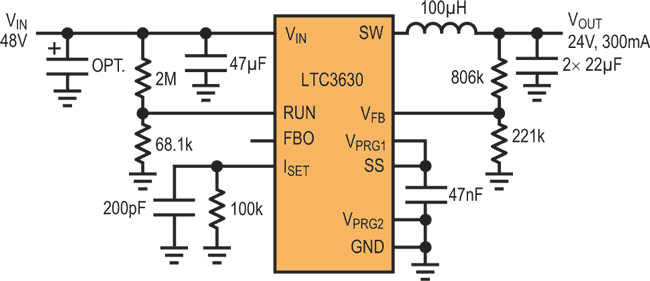 |
|
| Figure 1. | High Efficiency 24 V Regulator with Undervoltage Lockout and 300 mA Current Limit. |
Figure 1 shows a 48 V to 24 V application that showcases several of the LTC3630’s features, including the undervoltage lockout and output current limit. Operational efficiencies are shown in Figure 2.
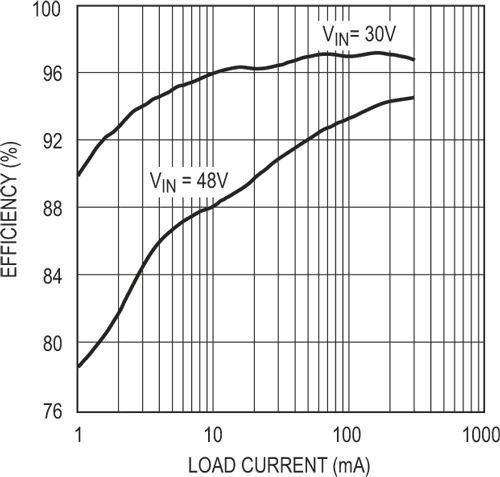 |
|
| Figure 2. | Efficiency of Circuit in Figure 1. |
The RUN pin is programmed for VIN undervoltage lockout threshold levels of 27 V rising and 24 V falling. Figure 3 shows VOUT vs. VIN. This feature assures that VOUT is in regulation only when sufficient input voltage is available.
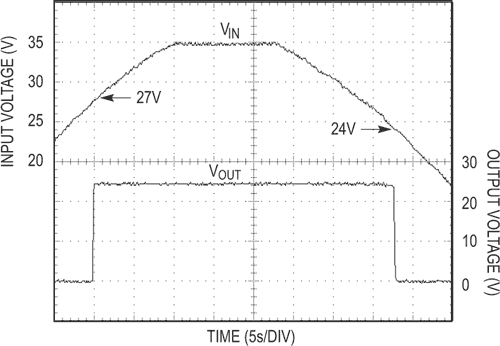 |
|
| Figure 3. | Input Voltage Sweep vs Output Voltage Showing Undervoltage Lockout Threshold Levels. |
The 24 V output voltage can be programmed using the 800 mV 1% reference or one of the preset voltages. This circuit uses the 5 V preset option along with feedback resistors to program the output voltage. This increases circuit noise immunity and allows lower value feedback resistors to be used.
Although the LTC3630 can supply up to 500 mA of output current, the circuit in Figure 1 is programmed for a maximum of 300 mA. An internally generated 5 μA bias out of the ISET pin produces a voltage across an ISET resistor, which determines the maximum output current. Figure 4 shows the output voltage as a resistive load is varied from approximately 100 Ω down to 8 Ω while maintaining the output current near the programmed value of 300 mA.
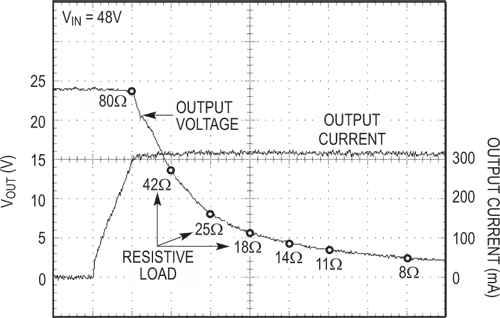 |
|
| Figure 4. | Resistive Load Sweep vs Output Current vs Output Voltage with Output Current Limit Set to 300 mA. |
In addition, the hysteretic topology used in this DC/DC converter provides inherent short-circuit protection.
Input Current Limit
Another useful feature of the LTC3630 is shown in Figure 5. In this 5 V circuit, the current limit is set by a resistive divider from VIN to ISET, which produces a voltage on the ISET pin that tracks VIN. This allows VIN to control output current which determines input current.
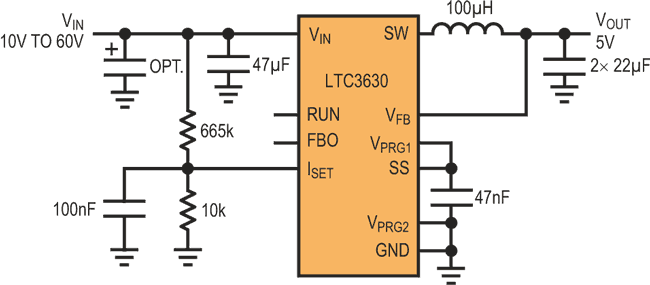 |
|
| Figure 5. | 5 V Regulator with 55 mA Input Current Limit. |
An increased voltage on ISET increases the converter’s current limit. Figure 6 shows the steady-state input current vs. input voltage and the available output current before the output voltage begins to drop out of regulation. For the values shown in Figure 5, the input current is limited to approximately 55 mA over a 10 V to 60 V input voltage range.
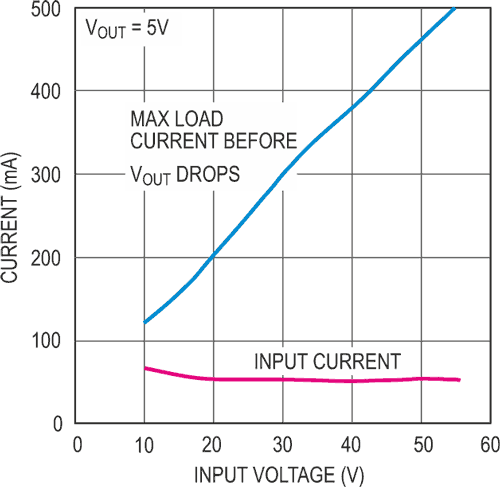 |
|
| Figure 6. | Input Voltage vs Load Current and Input Current with Input Current Limit Circuit Shown in Figure 5. |
Conclusion
The LTC3630 offers a mixture of features useful in high efficiency, high voltage applications. Its wide output voltage range, adjustable current capabilities and inherent short-circuit tolerant operation makes this DC/DC converter an easy fit in demanding applications.
